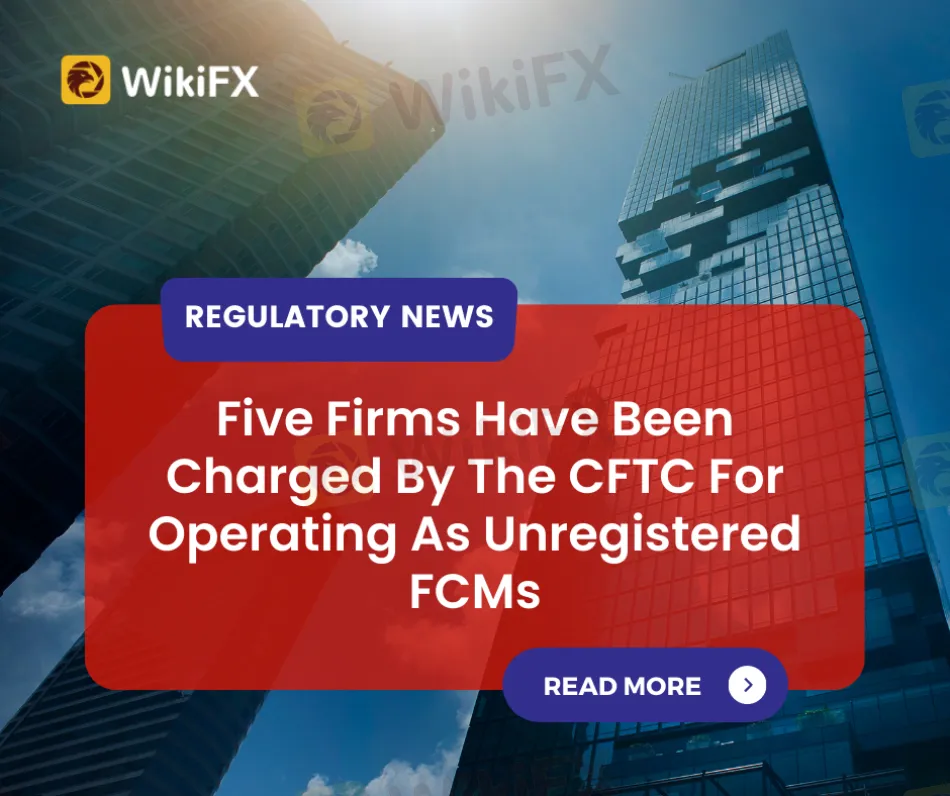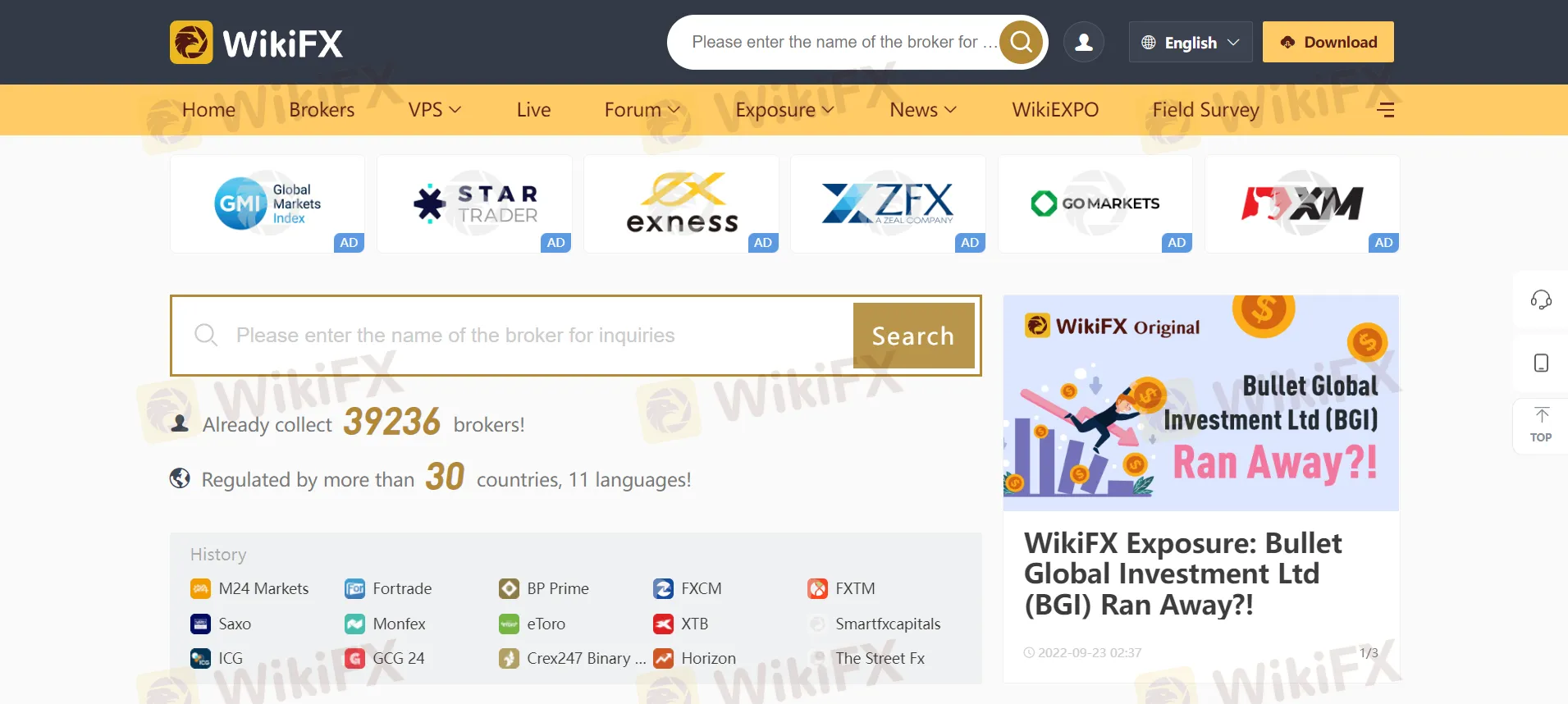简体中文
繁體中文
English
Pусский
日本語
ภาษาไทย
Tiếng Việt
Bahasa Indonesia
Español
हिन्दी
Filippiiniläinen
Français
Deutsch
Português
Türkçe
한국어
العربية
Five Firms Have Been Charged By The CFTC For Operating As Unregistered FCMs
Abstract:According to the allegations, the firms functioned as FCMs and purported to be regulated by the CFTC from roughly July 2022 until the present, but are not registered as required by the CEA.

Five organizations have been charged by the Commodity Futures Trading Commission for acting as unregistered futures commission merchants (FCM). Cryptostockoptionstrade Ltd., Global Smart Options Broker Ltd., Hypertradingoption Ltd., StockbrokerTechniques Ltd., and SprintTrade are the organizations that claim to be headquartered in either New York, New York, or at the same street address in Los Angeles, California.
Each complaint requests an order ordering the respondent to stop violating the Commodity Exchange Act (CEA) and CFTC rules.
According to the allegations, the firms functioned as FCMs and purported to be regulated by the CFTC from roughly July 2022 until the present, but are not registered as required by the CEA.
All of the responders, as claimed, claim to be among the major platforms providing binary options, forex, and spreads. Four of the five websites also include alleged client testimonials claiming to have made large sums of money trading binary options with that company. None of these companies, according to the accusations, are registered with the CFTC in any capacity.
About CFTC
The Commodity Futures Trading Commission (CFTC) is a US government-created independent organization that supervises the US derivatives market, which includes futures, swaps, and some types of options.
The Commodity Exchange Act (CEA), 7 U.S.C. 1 et seq., outlaws fraudulent behavior in futures, swaps, and other derivatives trading. The CFTC's declared objective is to enhance the integrity, resilience, and vitality of the United States derivatives markets via effective regulation. The CFTC has been working to bring greater transparency and good regulation to the multitrillion-dollar swaps industry since the financial crisis of 2007-08, and since 2010 with the Dodd-Frank Wall Street Reform and Consumer Protection Act.

Futures contracts for agricultural commodities have been traded in the United States for over 150 years and have been regulated by the federal government since the 1920s. The Grain Futures Act of 1922 established the fundamental power, which was modified by the Commodity Exchange Act of 1936. (7 U.S.C. 1 et seq.).
Trading in futures contracts has quickly extended beyond conventional physical and agricultural commodities into a diverse range of financial instruments such as foreign currencies, US and foreign government securities, and US and international stock indexes since the 1970s.
The CFTC was established by Congress in 1974 as an independent federal regulatory agency. The Commodity Futures Trading Commission Act of 1974 (P.L. 93-463) established the CFTC to replace the Commodity Exchange Authority of the United States Department of Agriculture. The Act significantly modified the Commodity Exchange Act (CEA) of 1936, which in turn changed the original Grain Futures Act of 1922. (7 U.S.C. 1 et seq.). The initial members, as well as the first chairman, were chosen in 1975.
When Congress approved the Commodity Futures Modernization Act of 2000 in December 2000, it directed the Securities and Exchange Commission (SEC) and the CFTC to design a combined regulatory system for single-stock futures, the products of which started trading in November 2002.
The Dodd-Frank Wall Street Reform and Consumer Protection Act of 2010 expanded the CFTC's regulatory power to include the swaps markets. The swaps markets have a notional value of more than $400 trillion at the moment.
About WikiFX
WikiFX is a platform for searching worldwide corporate financial information. Its primary duty is to provide the included foreign exchange trading organizations with basic information searching, regulatory license seeking, the credit assessment, platform identification, and other services.

Over 39,000 brokers, both licensed and unregistered, are listed on the network. WikiFX's staff has been hard at work with 30 financial authorities from across the world to verify that the information supplied is factual and correct.
Stay tuned for more regulatory news.
Download the WikiFX App from the App Store or Google Play Store.

Disclaimer:
The views in this article only represent the author's personal views, and do not constitute investment advice on this platform. This platform does not guarantee the accuracy, completeness and timeliness of the information in the article, and will not be liable for any loss caused by the use of or reliance on the information in the article.
Read more

CySEC Revokes UFX Broker Licence as Reliantco Halts Global Operations
The Cyprus Securities and Exchange Commission (CySEC) has officially withdrawn the Cyprus Investment Firm (CIF) licence of Reliantco Investment Limited, the operator of UFX.com. This decision followed a six-month period during which the company failed to provide any investment services or perform investment activities.

Elon Musk Sparks Debate Over Presidential Power and Federal Reserve Independence
Elon Musk has voiced his support for the controversial idea that United States presidents should have a role in shaping Federal Reserve policies. This endorsement aligns with recent remarks from President-elect Donald Trump, who has hinted at revisiting the central bank's independence, a long-held tradition in the nation's financial governance.

Consob Sounds Alarm: WhatsApp & Telegram Users Vulnerable to Investment Scams
Italy's financial regulator, Consob, has raised alarms over an increase in fraudulent schemes targeting investors through mobile messaging platforms such as WhatsApp and Telegram.

Crypto 101: Coins vs Tokens
For those new to the world of cryptocurrency, terms like "coin" and "token" may seem interchangeable. However, understanding the distinction between these two digital assets is crucial for navigating the crypto landscape. Both coins and tokens serve as integral components of blockchain ecosystems, yet they differ in their functionalities, use cases, and the technologies underpinning them.
WikiFX Broker
Latest News
Tokyo Police Arrest 4 for Unregistered FX Trading Scheme
BSP Shuts Down Uno Forex Over Serious AML Violations
ACY Securities Expands Global Footprint with South Africa Acquisition
Rupee gains against Euro
WikiEXPO Global Expert Interview: The Future of Financial Regulation and Compliance
DFSA Warns of Fake Loan Approval Scam Using Its Logo
Consob Sounds Alarm: WhatsApp & Telegram Users Vulnerable to Investment Scams
CySEC Revokes UFX Broker Licence as Reliantco Halts Global Operations
Bitcoin ETF Options Get Closer to Reality with CFTC Clarification
Peso Depreciation to 59:$1 Likely Amid Strong Dollar Surge
Currency Calculator



